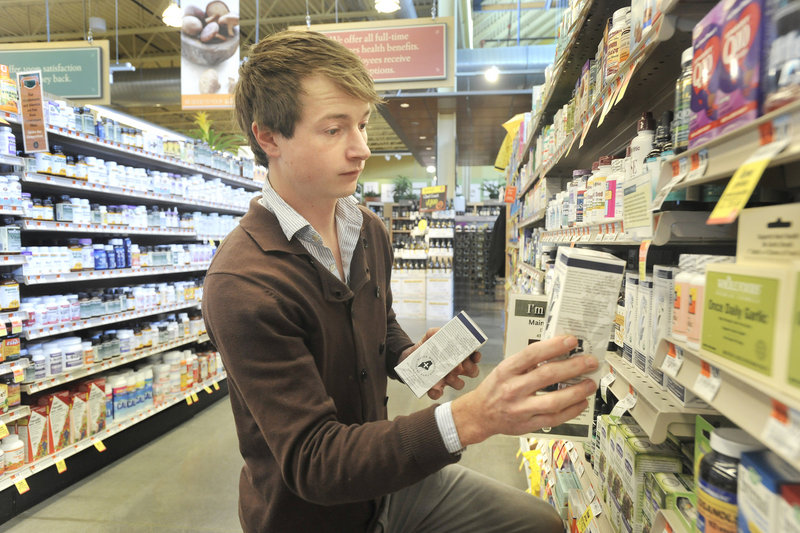PORTLAND – A Maine company that makes herbal supplements has received a $24,000 loan from Whole Foods Market, part of a $10 million fund the national retailer has set aside for small-business loans nationwide.
It’s the first loan the company has made in Maine.
The loan program reflects a national trend by major retailers to stock shelves with products made in the same region where they are sold.
Maine Medicinals, which produces organic elderberry syrup from berries grown on 10 acres in Dresden, received the loan through Whole Foods’ Local Producer Loan Program.
For Whole Foods, the program is an investment in local companies that provide local products, which are in high demand by Whole Foods customers. Maine Medicinals plans to use the money for improvements including irrigation systems and 8-foot-high deer fencing, said Geo Johnston, director of operations.
Elderberries are high in antioxidants and flavonoids, which may help promote health, prevent disease and fight cold and flu-like symptoms.
Maine Medicinals, which was launched in September 2009 by Geo’s mother, Edie Johnston, is the first Maine-based company to receive a Whole Foods loan.
Lee Kane, whose formal title is Whole Foods “EcoCzar and Forager” for the North Atlantic region, said the loan program supports small, sustainable businesses that might otherwise have trouble receiving a loan from a commercial bank.
Since the program’s inception roughly three years ago, Whole Foods has loaned about $4 million to 66 companies, including a wine sorbet maker and a fruit farm in New York, an egg producer in Austin, Texas, an organic dog treat maker in Las Vegas and a honey seller in West Palm Beach, Fla.
Edie Johnston of Maine Medicinals said her loan has a five-year term and a “very low interest rate.” Kane said Whole Foods’ interest rates range from 5 to 9 percent.
He said the company tends to avoid lending to startup businesses, focusing instead on companies that are already established and financially viable.
Kane said the Whole Foods loan program is part of a renewed effort to sell locally sourced products. The chain promotes the program on its web site and at regional local producer seminars.
Loan recipients aren’t required to produce organic products and do not need to be current Whole Foods suppliers, though Kane said the chain “obviously” favors current partners. Maine Medicinals products are available at Whole Foods.
Applications can be downloaded from Whole Foods’ website, and funds must be used for expansion or capital expenses, not operating costs. Loan amounts range between $1,000 and $100,000.
Other large retailers are also increasingly sourcing locally.
“More supermarkets are recognizing that local is a trend that is here to stay,” said Wendy Ward, a former farmer who is now local sourcing specialist at the Scarborough-based supermarket chain Hannaford Bros. Co. “People are mindful and spend when they know the money will go back into the local economy and support their neighbors.”
Ward said that about five years ago Hannaford began revitalizing its local sourcing program and, in 2008, launched Close to Home, an effort to better highlight the local products sold in the chain’s roughly 175 stores.
Hannaford defines local products as those sold in the same state where they are produced.
Hannaford publishes Close to Home magazine and promotes local products on its website and on store signs.
Hannaford also hosts education and networking events for local companies. The chain will attend next week’s meeting of the Maine Food Producers Alliance, a trade group for Maine entrepreneurs and manufacturers.
Ward said that unlike other chains that require local suppliers to sell products at regional warehouses, Hannaford’s suppliers can delivery products direct to stores. That approach, she said, lets the chain work with a wider variety of local companies.
Even national chain Wal-Mart Stores Inc. is expanding local offerings. On Oct. 14, the retail giant announced it would double sales of locally sourced produce in the United States by 2015.
If that goal is reached, 9 percent of produce sold in Wal-Mart stores will come from local suppliers, said spokesperson Kory Lundberg.
Lundberg said Wal-Mart’s produce buyers are searching for local sellers nationwide.
He said Wal-Mart’s Maine stores already sell local broccoli, corn, green beans, cranberries and potatoes. Maine produce is also shipped to stores in adjacent states.
The chain has some 317 suppliers in Maine and 22 stores in the state, 16 of which sell groceries.
Lundberg said buying local helps Wal-Mart minimize shipping expenses and retail prices, provide fresher produce and support local communities.
But he said Maine stores can’t rely exclusively on regional produce. “It’s tough to source locally in Maine in February.”
Staff Writer Jonathan Hemmerdinger can be reached at 791-6316 or at: jhemmerdinger@mainetoday.com
Send questions/comments to the editors.



Success. Please wait for the page to reload. If the page does not reload within 5 seconds, please refresh the page.
Enter your email and password to access comments.
Hi, to comment on stories you must . This profile is in addition to your subscription and website login.
Already have a commenting profile? .
Invalid username/password.
Please check your email to confirm and complete your registration.
Only subscribers are eligible to post comments. Please subscribe or login first for digital access. Here’s why.
Use the form below to reset your password. When you've submitted your account email, we will send an email with a reset code.